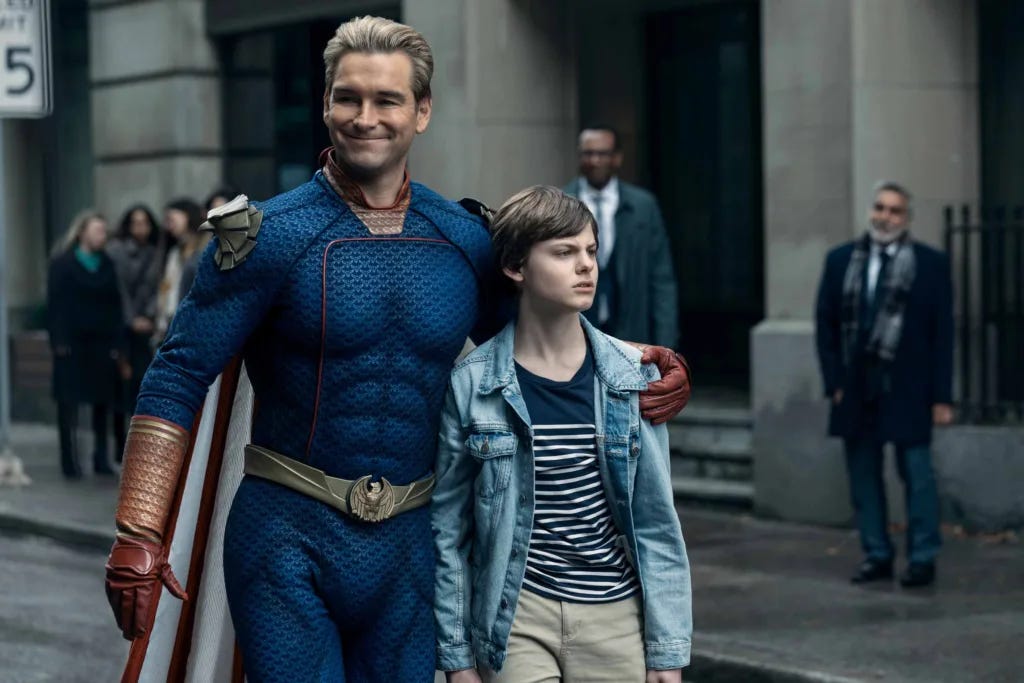The Boys SN4
The darkly satirical take on superheroes from Prime Video still boasts plenty of naughty thrills in its latest outing, though a surfeit of characters is a drag on the narrative momentum.
“The Boys” has been one of streaming television’s cleverest and most subversive shows in recent years, casting a satirical eye at our collective obsession with superheroes long before anyone started griping about the MCU losing its mojo.
Basically, it’s grand unifying mega-joke was to imagine what the introduction of super-powered human beings into our twisted, carping society would actually look like. To wit: corporations and politicians using supes for their own twisted ends, who in turn reflect and amplify the ethos of me-first malevolence.
Thus Homelander, the centerpiece hero played by Antony Starr, resembles Superman in both image and powers, but is actually an anxiety-ridden, deeply psychotic killer.
Based on the comic book series created by Garth Ennis and Darick Robertson, the Amazon Prime Show has steadily built narrative momentum through its first three seasons, with the stakes getting bigger and bigger each time.
To make an extraordinarily brief recap, it’s seen Homelander take over as the unquestioned leader of the Vought corporation, which both created and controls superheroes, while the scrappy titular crew of rebellious malcontents attempts to take him down, led by black ops hooligan Billy Butcher (Karl Urban).
The fourth outing still boasts plenty of naughty thrills — with the show’s horror-adjacent zest for splatter kills and unabashed nudity showing no signs of abating. If you’re into wading through a veritable feast of lasered brains, shredded viscera and waggling dicks, belly up to the table.
But for my taste, the fourth season just doesn’t have the same storytelling inertia. There doesn’t seem to be a unifying narrative thread, more like a collection of individualized sequences — cool as some of them may be.
It’s a typical problem for even the best of shows as they get into middle age: having created new characters faster than they off the existing ones, there is now a surfeit of people occupying the show’s mythology. Each represents a figurative mouth needing to be fed, and even with eight episodes at about an hour each, some of them just go hungry.
You get a lot of storytelling that feels like “check-ins” with characters: here’s what’s happening with Hughie, the lovable normie nerd played by Jack Quaid, and his ongoing romance with Starlight aka Annie January (Erin Moriarty), a former teammate of Homelander on his squad of A-list superheroes The Seven, and now leading the PR resistance against him.
Family health issues play a role in Hughie’s plight, with Simon Pegg returning as his dad.
Similarly, their fellow upstart, Frenchie (Tomer Capone), deals with romantic and substance abuse issues that feel like a tired retread. His friendship-and-maybe-more relationship with mute mutant killer Kimiko (Karen Fukuhara), appears to be going nowhere, though she gets her own interesting subplot hunting down her former child slavery cabal.
Marvin (Laz Alonso), previously a reluctant recruit to The Boys, takes over the leadership reins as they are unofficially backed by the CIA in going after Homelander and Vought. (Sadly, no one calls him by his nickname, Mother’s Milk, anymore.) Butcher, for his part, has been thoroughly sidelined from the team and starts to collaborate with familiar face Jeffrey Dean Morgan — Negan forever! — playing an old collaborator from his spy spook days.
Sub-antagonists from the Seven return, notably speedster A-Train (Jessie T. Usher) and pan-species-sexual wet noodle The Deep (Chace Crawford). Black Noir, who we saw definitely killed by Homelander last season with a memorable defenestration of his midsection, somehow returns (played by Nathan Mitchell), and nobody much talks about how this can be… but stay tuned.
Claudia Doumit is also back as Victoria Neuman, a power-playing politician in line to become the Vice President but herself secretly a supe with the ability to pop people’s brains with just a thought. She and The Boys trade positions as antagonists and allies throughout the season. Colby Minifie shines as Vought figurehead Ashley, steaming under Homelander’s yoke.
The two most notable newcomers are Homelander recruits: Firecracker (Valorie Curry) is a Fox News-type raver who talks a big game about groomers and conspiracy theories but seems awfully light when it comes to actual super abilities. And Sister Sage (Susan Heyward) is ‘Earth’s smartest sentient being,’ who’s similar devoid of flash-bang qualities but brings a strategic spin to Homelander’s usual dictatorship-by-id M.O.
The one thing the season really leans into is amping up the Red State/Blue State parallels, broadly hinted at before but now fully lit at center stage. Homelander, his superhero toadies and Vought are lined up in the Trumpian corner, sneering flag-wavers who lie like breathing, with Starlite leading the charge of the female-centric, multicultural upstarts fighting an uphill battle where the truth makes for a poor weapon.
If you’re looking for both-sides balance, you might as well learn to fly. All this would be more palatable if it were particularly funny or interesting, but it’s not. Even throwaway jokes like “critical supe theory” feel pithy, but moldly.
On the secondary stage is the ongoing rivalry between Homelander and Butcher over the fate of Ryan (Cameron Crovetti), Homelander’s newly discovered biological son and Butcher’s adopted one. Homelander is gradually grooming the kid in his own image, teaching that humans are just toys for their amusement, and it’s genuinely harrowing to see those foul lessons start to take root.
Accompanying the privilege of seeing “The Boys” SN4 early is a list of do-not-reveal warnings longer than Homelander’s cape, which I’ve endeavored to observe (I hope!). So I can’t call out too many specifics at this time of exact plot developments.
So, speaking generally and spoiler-free, the fourth season still his plenty of moments of crackling, cackling fun. But that’s just what they are — moments.
If there’s a narrative throughline to all this, its power is rendering itself very hard to see.





